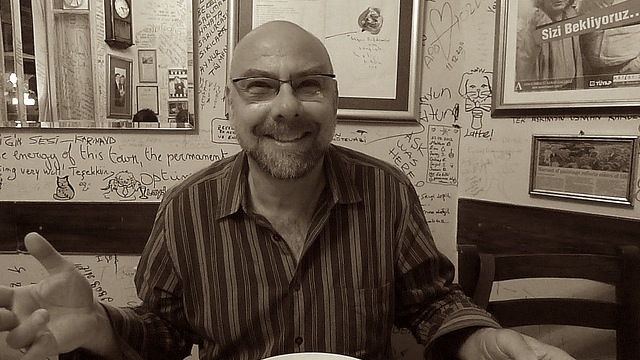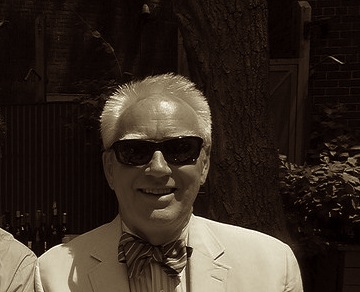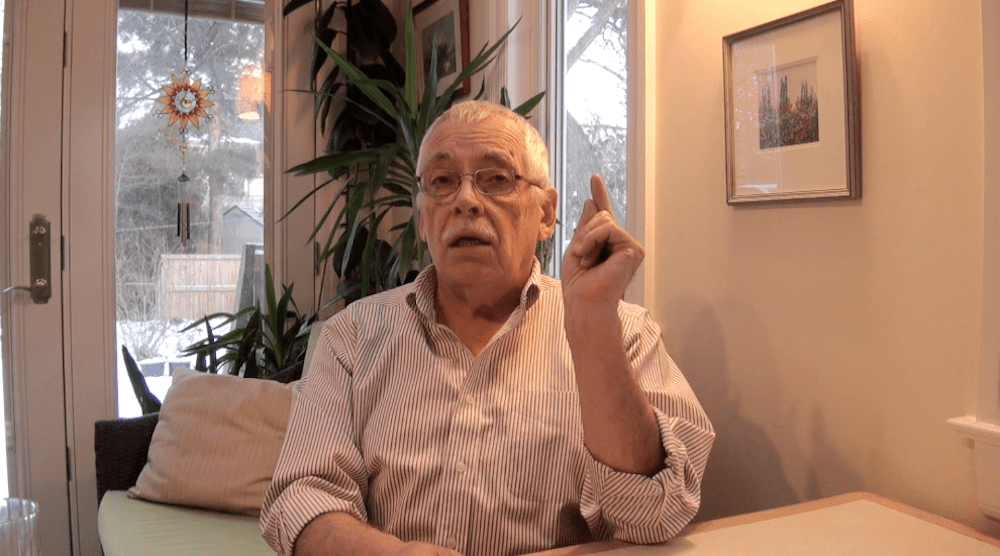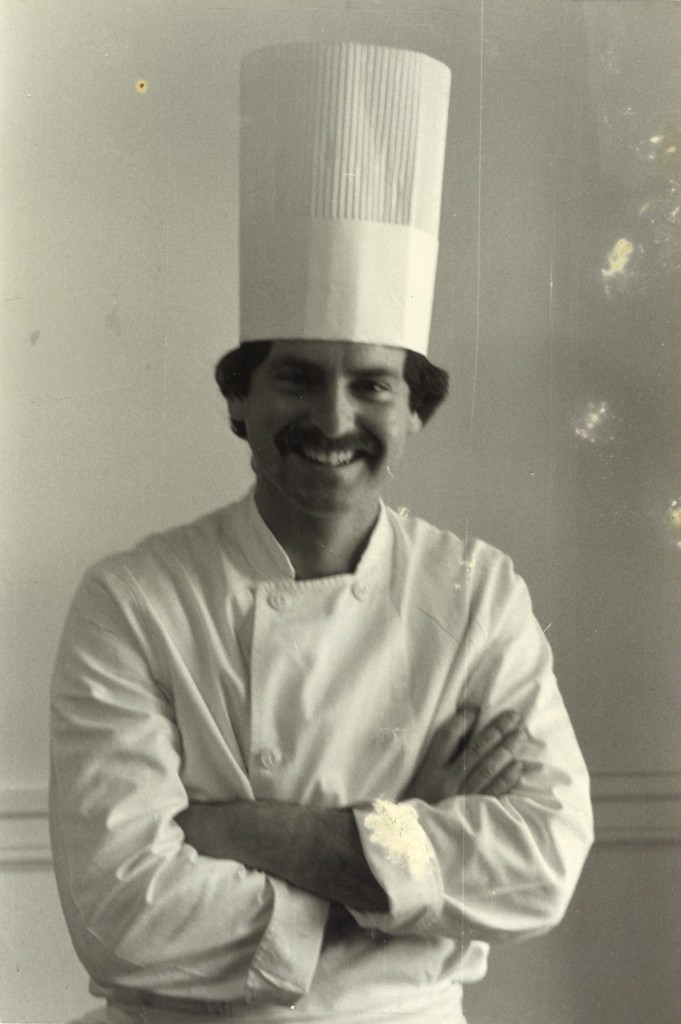
Head Chef Scott Willows in 1974 at Windermere House, Port Carling.
In the third of a new series we probe the memories and minds of some of the founding fathers and original influencers of Toronto’s restaurant scene.
This week we speak at length with a true veteran of Toronto’s dining scene, Scott Willows.
I see Scott as a Good Food Revolutionary of sorts, a man, who with his much-missed Patriot restaurant in Bloor Street’s Colonnade building, brought the concept of eating local to a Yorkville which at that particular moment in time was not quite ready for such a revolution. Along with Chef David Chrystian, Willows had created what I considered to be the perfect Canadian restaurant.
Ladies and Gentlemen, may I introduce the measured sage wisdoms of Scott Willows…
Good Food Revolution: Hello Scott. Now how long have you been involved in Toronto’s hospitality industry and where did you get your start? Please remind us of your history in the industry.
Scott Willows: I started working as a dishwasher during the summer at The Delawana Inn in Muskoka when I was 13.
By the time I was 21 I was working as the Head Chef at Windermere House, a beautiful old Victorian era Resort on Lake Joseph near Port Carling.
While I was attending the University of Toronto I was an apprentice at a restaurant owned by David Barette and Nicolas Pearce (Fentons) I paid for my tuition and a trip to Europe every year by running the kitchen at Windermere during the five months it was open.
Nicolas and David inspired me to get serious about pursuing the Hospitality Industry as a career. After I graduated from Victoria College with a BA in English Literature… I did.
I enrolled and completed The Culinary Management program at George Brown College.
The course was in its infancy and commandeered by the charismatic Brian Cooper. I also completed what I believe was the first sommelier program in Toronto taught by the incomparable Jacques Marie.
Some of my classmates included Chris Boland (Toronto) Mark Robertson (Vancouver) and Paul Grieco (New York City)
Later I served on the Board of Directors of the VQA for 6 years sponsored having been sponsored by Len Pennachetti and Don Ziraldo.
So that was my foundation and over the years I have had some great experiences working as General Manager for some of the top operators in the business. Highlights include:
Rhodes Toronto (Chrysalis) with Neil Vosburgh
Auberge Du Pommier Toronto, with Peter Oliver, Michael Bonacini, Anthony Walsh, JP Challet
Oscars Winnipeg with Oscar and Nolan Grubert
The Willow Inn Montreal with Jim and Weir Ross
The Cannery Seafood Restaurant Vancouver with Bud Kanke.
The Mike Smith Restaurant Group London Ontario. With Mike Smith
I have also been a partner in two locavore themed restaurants: Metropolis and Patriot.
More Recently I completed my MBA at The University of Guelph (2008)
GFR: And although this is a huge question, what are the most significant changes that you have seen in the dining scene over the decades? Where is Toronto at today and what have we seen by way of changes since you were in the game?
SW: Three things
The sheer volume of business has mushroomed since I started back in the seventies.
Compared to the Toronto I grew up in the city core is unrecognizable.
The diversity of cuisines, the proliferation of concepts and the business opportunities has exploded.
The most interesting change has been the acceptance of the hospitality industry as a career choice for young Canadians. When I started the industry was run by transplanted and cranky German, Swiss, French and British chefs. The hospitality industry was viewed as an odd and a somewhat exotic career choice.
GFR: How do you feel about Toronto as a restaurant city? Do you feel as if we are world class in this department or do we still have some way to go?
SW: Well I hope we don’t think we need to get too caught up in that obsession. But yes I think we do have restaurants that compete with restaurants at any level all over the world.
GFR: What with a number of New York Chefs opening outposts in our fair city, what do you think that this says about the evolution of our dining scene, and perhaps more poignantly global dining as a whole?
SW: It is a sign of the times when big players feel confident about investing in Toronto…whether it be in the arts, commercial development, sports franchises or restaurants. Wherever the capital comes from It is an indication that there is a core wealth here that can attract support and sustain big ideas.
So I think having Big Name chefs setting up shop in Toronto is a good thing. It certainly raises the bar.
GFR: Message boards such as Chowhound often bemoan the lack of polished service in Toronto? Do you see any truth in this?
SW: I’m not a big user or observer of what goes on sites like Chowhound. The anonymity of the commentators doesn’t give me a great sense that there any kind of objectivity inherent in the process.
A diversity of opinions on the internet is a good thing but it does not mean they are informed opinions or unbiased commentaries.
GFR: What in your mind makes for good service?
SW: Product Knowledge… Empathy/Attitude/Team Work.
It all comes down to a good floor manager leading the troops by example and insuring that the business’s core values are executed in a seamless performance day in and day out.
It is very satisfying and fun when it works.
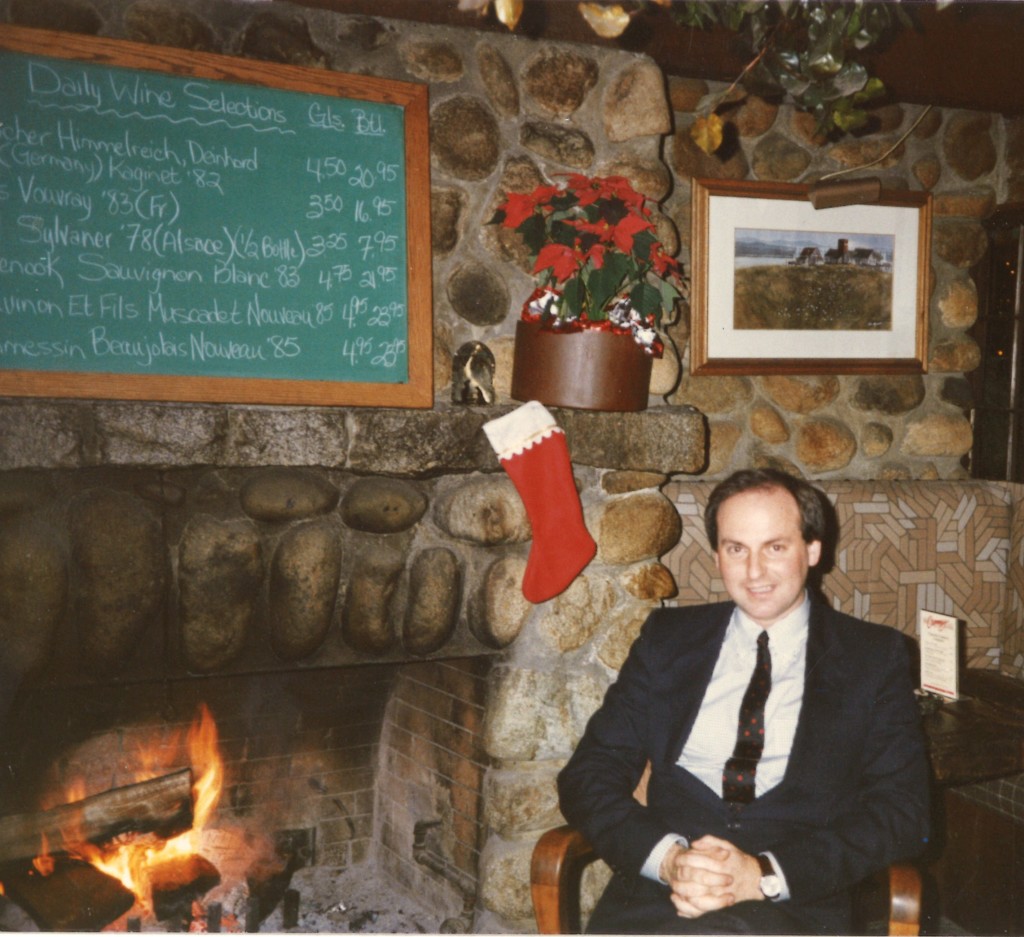
General Manager Scott Willows in 1987 at The Cannery Seafood Restaurant, Vancouver… and just look at those wine prices!
GFR: Over the years, where have you experienced the best service in Toronto?
SW: The best service? That’s a hard one…I cannot say that I have been honestly blown away by any individual service experience. Partly because if you are an industry veteran you tend to get better than average attention. It’s a “we take care of our own” attitude that has always been an attractive part of the Toronto restaurant scene.
I can say I am proud of the service teams I worked with at Fentons, Rhodes, Auberge Du Pommier in Toronto and at The Cannery in Vancouver.
GFR: Does the future of the independent restaurant in Toronto look bleak or blissful from you point of view?
SW: It is a tough road for the little guy. And tougher as costs rise, and competition increases.
Often to make ends meet a passion for independence and artistry ends up being a 7 day a week proposition.
And that often leads to fractured personal lives.
If you can find a “partner” with deep pockets and lots of patience to see you through the early years then you may survive and get over the hump. But that is rare.
You cannot do it alone. Picking the right financial/working partner is your most important decision.
But there will always be dreamers who ignore the bleak and embrace the bliss.
And you better have a plan to stand out from the crowd and offer some sort of niche but consistent experience for your customers.
But sometimes at the end of the day it’s also good to get a regular paycheque and health benefits.
You can also enjoy a great deal of creative and operational freedom working for someone else but you need to earn their trust.
GFR: “No-shows” can be the death of a small establishment. What do you feel can be done (legally) to combat such situations?
SW: There is nothing to be gained (legally) or otherwise by penalizing a customer for not showing up.
You as an operator need to learn how to manage your customer’s flow and expectations.
You just need to learn how to tap-dance ….and have a few tricks up your sleeve.
GFR: So do you feel that a “no reservations” policy is a sensible solution for a smaller restaurant?
SW: Many patrons do not want to hear it but generally a restaurant needs to turn over tables twice during a service period or at least during peak operating days
Part of the skill of an operator is to develop a Revenue Management system.
You need to identify individual customer patterns.
You need to know what events around you will affect your customer flow.
You need a bar as a holding area and as an alternative seating source.
GFR: How do you feel the recent increase in minimum wage in Ontario impacts the restauranteur?
SW: The rise of minimum wage over time ….Like death and taxes is inevitable. Restaurateurs will adjust their prices accordingly and the Circle of Life will continue.
GFR: Getting into the area of tips? Do you feel that serving staff should payout something to to the house for breakages and the like? What do you feel is fair or are such expenses just a cost of doing business?
SW: The cost of breakage is an operator’s problem. If an employee has a clumsy streak that is a personnel issue not a breakage problem.
GFR: And what are your thoughts on the recent case regarding Mario Batali settling a lawsuit regarding skimming of tips to the tune of $5.25 million?
SW: There isn’t too much detail in this article but I am a full proponent of tip pooling.
The back of the house works as hard as the front of the house in creating the total customer experience.
Whatever system is in place however has to be totally transparent (i.e.) if servers are “tipping out 4% of sales” then there should be no mystery about how the process works and how where and to whom the money is going.
GFR: On the subject of Toronto restaurant critics, do you feel that any are worth their salt?
SW: Ah… big topic. And I speak as one who has been the recipient of more great press than most.
When I worked for myself I was praised to the skies.
When I worked for the big guys not so much.
I can only assume that I represented the little guy against the world.
I also had an innate talent for knowing when a critic was in the house.
The only horrific review I ever received was from the son of a famous author working for Conrad Black’s then new National Newspaper. I mention this because it kind of sums up my overall view of the subject.
Besides wondering (as I’m sure many did) what his qualifications were to review restaurants….
He stuck out like a sore thumb with his brass buttoned blazer and ascot.
On reviewing my restaurant (Patriot) not only did he “not get” the concept of a Canadian Cuisine he thought it was a stupid idea.
At the end of his meal he ordered Foie Gras Poutine TO GO and in his review (without indicating that he had ordered it as take-out) complained that the fries were cold and limp and that the dish was a disaster.
Although I have in the past profited from praise from the critics I am wary of their influence. They may send hoards of foodies to your doors initially but it is up to you as an operator to sustain and build on that initial curiosity. Food writers all have their own an agenda and that is to create an audience for their column.
GFR: And how do you feel about the legitimacy of guides like Zagat and its ilk?
SW: Same as above. And it rubs me the wrong way (although I know they hire local correspondents) when I think that an American outfit is rating us.
GFR: And then of course we have the democratization of food writing… food bloggers… where do you stand on this particular issue?
SW: All the more power to them.
Once again as a veteran of the bizz I find that much of what is published is often cringe-worthy.
“A little bit of knowledge” can be a dangerous thing.
GFR: It appears to me that Toronto goes through very obvious trends in its restaurants (tacos, bacon on and in everything) I’d love to hear your thoughts on this topic?
SW: Well I’m always interested in what ethnic groups populate the back of the house/ entry level positions in a restaurant.
In New York and Chicago it is Mexicans.In Paris it is Algerians and Moroccans.
In my day it was Vietnamese and these days I think we lean heavily on East Asian immigrants to fill the minimum wage positions.I wonder who’s next?
Also when our family in the sixties went to China Town (on Elizabeth St near the bus terminal) after church on sundays we chowed down on a North American version of Cantonese cuisine.Now of course the diversification of cuisines from all over the world is a delight ,a credit and a symbol of Toronto’s growing multi-cultural makeup.
The other trend I find amusing is the proliferation of casual dining venues….Moxies, Astors, Earls, Joeys, etc….they are all the same restaurant.
They are the new burger chains.
They homogenize all the latest trends into one menu.
GFR: Speaking of trends, I feel that your were well ahead of the curve when it comes to the procurement of local produce and the like with The Patriot. I guess that Toronto just wasn’t ready for such a concept at that point in time?
SW: You know what they say “you can always pick out the pioneers…they are the ones with the arrows in their back…”
But Patriot did not fail due to its’ concept. We certainly received more than enough praise and support-especially from the arts community. And I will always be grateful for their loyalty and friendship.
We had a business model that was flawed and not sustainable for the long run.
For example part of the allure of our location (second floor) was a promise by the landlord that we would after 2 years have a street level patio in the summer. (Our business died in the summer). But the other residents and retail tenants (who had been around a lot longer than us) were strongly against it.
That effectively killed an essential part of our original business plan.
I was not the first and I’m sure I will not be the last to face that very difficult decision to cut your losses and move on if there was no light at the end of the tunnel.
GFR: And what, in your sage wisdom, do you predict for the future?
SW: I’ve never been very good about predicting the future.
I do some consulting now for start-ups. My main value as I see it to help fledgling restaurateurs avoid making the same mistakes that I or colleagues of mine have made.

Industry Veteran Scot Willows today.
GFR: Food Television has exploded over the past 10 years… how accurate a portrayal do you feel it paints of our industry?
SW: I’m not a big fan or watcher of the “Reality Genre” cooking competitions…etc. It is too cartoony and contrived for my taste. These shows as entertaining as they might try to be are far from a realistic portrayal of the industry.
Inventory, food-costing ,working split shifts ,weekends and cleaning out the refrigerator at the end of the night doesn’t make for great TV.
I do enjoy Food shows that are fun and irreverent and have a travelogue angle…Anthony Bourdain, Guy Fieri …or shows that just show you how to make stuff. (Anna Olson)
Good Food Revolution does a great job of filling in the gaps and keeping it real on a grass roots basis.
Where else can I see intelligent interviews with people like Steven Campbell, and Ann Dowsett Johnson or a “Testina” demo by Mark Cutrara or a segment called “Tasting with Rothko”?
Pretty great stuff!
GFR: *blush*
Canadian wines have come a long way since I arrived in Canada 17 years ago. Do you still feel that there is a resistance to them in some quarters? And why do you think that could be?
SW: I’ve always been a supporter of Canadian wines from the early days and I served on the VQA board for some time. Exposure to first attempts at Canadian wine making might be a negative factor.
I’ve always thought that a consumer that doesn’t recognize the excellence of Canadian wine is just is just not a sophisticated consumer. There’s lots of those out there.
It may be that for many Canadian exports (including artists) are not deemed a success unless they are celebrated on the international stage.
We just don’t make enough product to manage that. And really the rest of us know that Canada is making wine that compares favourably with the best wine regions in the world. We’ve only really been in the game for 30 years so it is remarkable what has been accomplished.
GFR: Is there anything else you would like me to touch upon?
SW: Jamie Thanks for an opportunity to play…”This is your life” (This was the PG version.)
Keep up the Good Fight.
GFR: Scott, thank you very much for your time, and thank you for all the encouragement!
…
 Edinburgh-born/Toronto-based Sommelier, consultant, writer, judge, and educator Jamie Drummond is the Director of Programs/Editor of Good Food Revolution… And he is still extremely embarrassed at having organised a Granite Club Food and Beverage managers’ night out at The Patriot and have the majority of the group acting like boors and/or petulant children. Sorry Scott.
Edinburgh-born/Toronto-based Sommelier, consultant, writer, judge, and educator Jamie Drummond is the Director of Programs/Editor of Good Food Revolution… And he is still extremely embarrassed at having organised a Granite Club Food and Beverage managers’ night out at The Patriot and have the majority of the group acting like boors and/or petulant children. Sorry Scott.



